
To the physicist, the distinction between concept and mathematical formalism seems arbitrary. As one faculty colleague likes to say, "the concepts are the math and the math are the concepts." I present research on the analysis of faculty discourse. These chiefly involve manipulating mathematical equations to illuminate a physical principle. Observations are interpreted through a lens of symbolic forms, conceptual and contextual meanings that are embedded in the equation. When an equation is manipulated (e.g. bringing terms to one side or another), different forms are emphasized, changing the meaning of the equation. I'll argue that this framework can make explicit the faculty motivations for the moves, and present observations of manipulations that appear to have distinctly different reasons. Some manipulations bring about a change in context from a physics to a mathematical frame. Others can be thought of as thematic manipulations --- e.g. grouping all terms of a common variable --- which reveal important conceptual points (e.g. amplitude dependence of a driven harmonic oscillator). While there is direct evidence from observed faculty to support the inference of these motivations, in neither case is the reasoning made clear to the students. These analyses lead discussion of pedagogy in a new direction, one that strikes at the heart of what it means to understand a mathematical representation.
